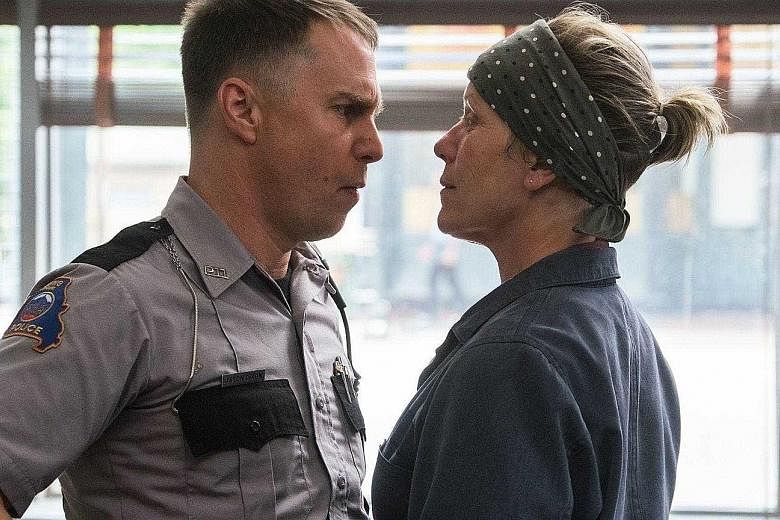NEW YORK • If you just plaster Sam Rockwell's face on a billboard, it is unlikely many can come up with his name.
No wonder the actor said: "You probably know me as 'that guy from that movie,'" during his opening monologue on Saturday Night Live last month.
The 49-year-old favourite for the Best Supporting Actor Oscar has a gift for playing droll, loopy characters most at home on society's margins, in films such as The Green Mile (1999) and The Way, Way Back (2013). The Oscars will be held on Monday morning (Singapore time).
Now, he has been thrust to the fore with his award-winning performance as racist police officer Jason Dixon, in Three Billboards Outside Ebbing, Missouri.
The movie has drawn criticism for its use of racial slurs and depictions of consequence-free violence, but Rockwell said complex stories are bound to "stir up a lot of feelings".
He was chatting over the telephone, shortly after winning a Bafta (the British equivalent of the Oscars). These are edited excerpts.
In your opening monologue for Saturday Night Live, you made light of your work as a long-standing character actor. Does that designation bother you? We were making fun of my persona. I'm not a household name like Brad Pitt. People like to have labels for actors and, the truth is, every actor is a character actor. When I say actor, I mean actresses as well.
Toni Collette is a good example of someone who can do both leading lady and transformational characters, in which you are barely recognising them. I think Billy Crudup, Christopher Walken, Robert de Niro - they are all great examples of that.
People often use the word "quirky" to describe your characters. Do they all have to be iterations of you?
I think in every character, you're finding a version of yourself. I do not relate to racism because I was not brought up that way.
I can relate to self-loathing. The reason a person lashes out the way Dixon does is because he hates himself, so anybody can relate to that.
I am drawn to complex characters. They are all filled with so many feelings.
What do you think it was about this role and film that led to so many awards?
It is the transformational aspect of it - the fact that he was many roles wrapped up in one role.
He is a doofus, he is a racist, he is violent, he is a mama's boy. There are a few heroic things at certain points. But he is flawed and it's a boy-to-man journey.
There has been criticism that your character got away scot-free for his racist behaviour and for throwing a guy out of the window and never being brought to justice. It is a small town and, who knows, in real life, maybe he would have got thrown in prison. It is a sort of dark fairy tale in certain ways - it is not necessarily meant to be completely realistic.
If it is meant to be realistic, in real life, things are not tied up in a bow. People who deserve to get punished do not necessarily get punished.
Did it surprise you that there was criticism of the movie along these lines?
No. Whenever a movie is popular and it is a complex dramatic story, I think it is going to stir up a lot of feelings.
A lot of good stuff comes out of it - the billboards that have been popping up (activists re-created versions of the billboards in London and Miami lamenting the lack of progress in rehousing those affected by the Grenfell Tower fire and enacting gun control measures respectively).
That is kind of incredible, when a movie can effect social change.
I think Mildred (the film's mother, played by Frances McDormand, who is seeking justice in the murder of her daughter) is a beautiful working-class wonder woman in some ways. It is a kind of antihero-slash-protagonist thing that I think women need right now.
Mildred and (directors) Greta Gerwig (behind Lady Bird) and Patty Jenkins (Wonder Woman). It has been an incredibly vibrant year.
Were you intimidated working with McDormand?
I think it is the biggest compliment to Frances that people are asking: "Were you intimidated by her?" Not really, but I was nervous to get in the ring with a great actor.
I have worked with a lot of great actors. She is really a force. I think what is great about her is her integrity. Her sense of truth is like an iron bar.
All these people - Woody (Harrelson, a co-star), Martin (McDonagh, the film's writer-director), Frances - are true anarchists, they really are. I think it comes through in their work. I am not exactly conventional either.
Your dad posted a comment on that New York Times essay criticising the film - he defended you. Was it definitely your dad? Yes. That was my father. I did not read the article, but they read that quote to me on the Jimmy Kimmel show. That was my dad being a supportive father. He was just looking out for the kid.
NYTIMES

